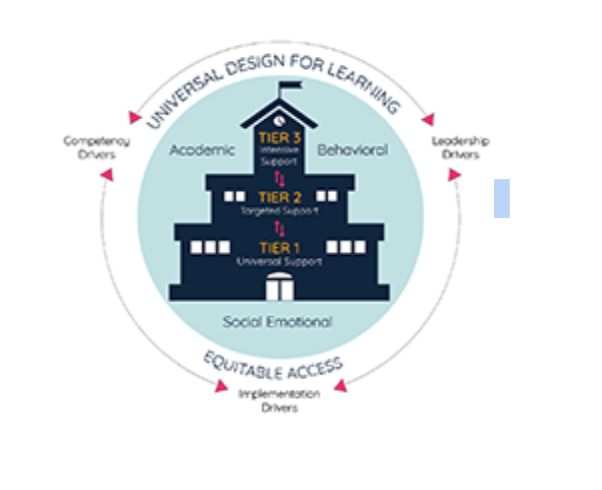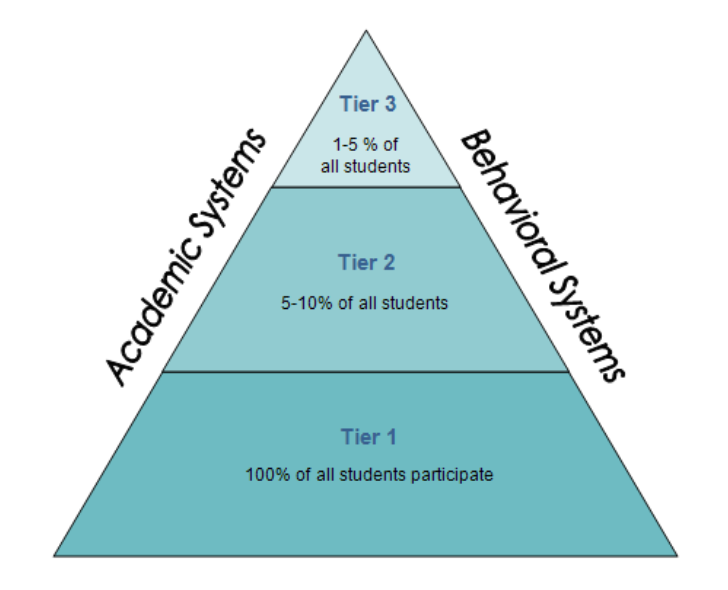Multi-Tiered Systems of Support (MTSS)
The Department of Secondary and Elementary Education have introduced A multi-tiered systems of support (MTSS) framework for how school districts can build the necessary systems to ensure that every student receives a high quality educational experience.  MTSS is designed to support schools with proactively identifying and addressing the strengths and needs of all students by optimizing data-driven decision-making, progress monitoring, and the use of evidence-based supports and strategies with increasing intensity to sustain student growth.
MTSS is designed to support schools with proactively identifying and addressing the strengths and needs of all students by optimizing data-driven decision-making, progress monitoring, and the use of evidence-based supports and strategies with increasing intensity to sustain student growth.
The MTSS framework has three "tiers." Each tier provides specific types and degrees of student support within the school setting:
Tier 1:
All children receive high quality curriculum and differential instruction in the general education classroom.

Tier 2:
The school provides help for students who need more support through small group, intensive instruction over a period of time.
Tier 3:
The school provides more individualized intensive instruction for students who need the most support.
Student Support Teams
To successfully implement a tiered system of support, Southbridge has created a collaborative school culture in which all staff take responsibility for the success of all students. Each school in the district has created Student Support Teams (SST) that meet regularly to address concerns about individual students or groups of students.
The Importance of Parent Involvement
- Communicate with your child's teacher(s)

- Participate in conferences and other meetings about your child
- Monitor and assist with homework assignments
- Talk with your child about school progress on a regular basis
Differentiation: instructional adaptations made in the classroom to support the diverse learning styles and needs of all students.
Intervention: a method, program, or instructional condition that provides additional learning support.
Progress Monitoring: the practice of frequently assessing a student's academic or behavioral achievement. Assessment results provide information to help teachers evaluate student needs and to match instruction to meet those needs.
Universal Assessment: an academic or behavioral test, administered to all students at a given grade level, at least three times during the school year. These are used to identify those students in need of additional interventions.
Sistema de Soporte de Múltiples Niveles (MTSS)
El Departamento de Educación Secundaria y Primaria ha presentado un marco de sistemas de apoyo de varios niveles (MTSS) sobre cómo los distritos escolares pueden construir los sistemas necesarios para garantizar que cada estudiante reciba una experiencia e

ducativa de alta calidad. MTSS está diseñado para ayudar a las escuelas a identificar y abordar de manera proactiva las fortalezas y necesidades de todos los estudiantes mediante la optimización de la toma de decisiones basada en datos, el control del progreso y el uso de apoyos y estrategias basados en evidencia con mayor intensidad para sostener el crecimiento de los estudiantes.
El marco MTSS tiene tres "niveles". Cada nivel proporciona tipos y grados específicos de apoyo estudiantil dentro del entorno escolar:
Tier 1:
Todos los niños reciben un plan de estudios de alta calidad e instrucción diferenciada en el salón de clases de educación general.

Tier 2:
La escuela brinda ayuda a los estudiantes que necesitan más apoyo a través de grupos pequeños,
instrucción intensiva durante un período de tiempo.
Tier 3:
La escuela brinda instrucción intensiva más individualizada para los estudiantes que necesitan más apoyo.
Equipos de Apoyo Estudiantil
Para implementar con éxito un sistema de apoyo escalonado, Southbridge ha creado una cultura escolar colaborativa en la que todo el personal asume la responsabilidad del éxito de todos los estudiantes. Cada escuela del distrito ha creado Equipos de Apoyo Estudiantil (SST, por sus siglas en inglés) que se reúnen regularmente para abordar inquietudes sobre estudiantes individuales o grupos de estudiantes.
La importancia de la participación de los padres
- Comunicarse con los maestros de su hijo
- Participar en conferencias y otras reuniones sobre su hijo
- Supervisar y ayudar con las tareas asignadas
- Hable con su hijo sobre el progreso escolar de manera regular

MTSS Glosario
Diferenciación: adaptaciones de instrucción hechas en el salón de clases para apoyar los diversos estilos de aprendizaje y necesidades de todos los estudiantes.
Intervención: un método, programa o condición de instrucción que proporciona apoyo de aprendizaje adicional.
Supervisión del progreso: la práctica de evaluar con frecuencia los logros académicos o conductuales de un estudiante. Los resultados de la evaluación brindan información para ayudar a los maestros a evaluar las necesidades de los estudiantes y combinar la instrucción para satisfacer esas necesidades.
Evaluación Universal: una prueba académica o de comportamiento, administrada a todos los estudiantes en un nivel de grado determinado, al menos tres veces durante el año escolar. Estos se utilizan para identificar a aquellos estudiantes que necesitan intervenciones adicionales.